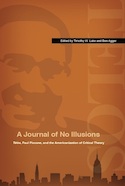A Journal of No Illusions: Telos, Paul Piccone, and the Americanization of Critical Theory is now available from Telos Press. Maxwell Woods talked with co-editor Ben Agger about the influence Telos has had on his intellectual development.
Maxwell Woods: How do you view your article, “My Telos: A Journal of No Illusions,” and your relationship to Telos today?
 Ben Agger: There has been such an explosion of publishing and publications since the late 60s, when Paul [Piccone] started Telos, that I just can’t keep up with journals and books. I used to pore over the latest issue of Telos as important intellectual sustenance, especially the latest intellectual news from Europe. Today there is less urgency about “keeping up” with publications, even though Telos remains a central part of my intellectual identity. As I say in my chapter, Telos helped formed me as I and others grappled with a humanist and phenomenological Marxism that helped explain America and the world during the 60s and 70s. Telos was a primer, although often a difficult one, for all of us on the New Left who were using Hegel, early Marx, Husserl, Sartre, et al. to understand civil rights, the women’s movement, the war in Vietnam—and our opposition to them. It is a sad commentary on the decline of discourse, as I term it, that books and journals matter less in our Internet age of instantaneity.
Ben Agger: There has been such an explosion of publishing and publications since the late 60s, when Paul [Piccone] started Telos, that I just can’t keep up with journals and books. I used to pore over the latest issue of Telos as important intellectual sustenance, especially the latest intellectual news from Europe. Today there is less urgency about “keeping up” with publications, even though Telos remains a central part of my intellectual identity. As I say in my chapter, Telos helped formed me as I and others grappled with a humanist and phenomenological Marxism that helped explain America and the world during the 60s and 70s. Telos was a primer, although often a difficult one, for all of us on the New Left who were using Hegel, early Marx, Husserl, Sartre, et al. to understand civil rights, the women’s movement, the war in Vietnam—and our opposition to them. It is a sad commentary on the decline of discourse, as I term it, that books and journals matter less in our Internet age of instantaneity.
Woods: You talk to some length about the influence Telos has had on your intellectual development. What important lessons did you learn through your engagement with Telos? You also discuss your relationship with various editors and writers at Telos. Which personalities did you interact with? How did your interaction with these personalities at Telos shape your intellectual development?
Agger: I was never a central figure in the Telos group. I was a grad student in Toronto when I met Paul and participated with other Toronto grad students in reviewing books and journals. I labored, with the help of Paul Breines, on a review essay I did for the journal. Paul, of course, was an exciting and charismatic figure! Being involved in the production of the journal, at least in a marginal way, helped show me how real intellectuals produce writing and do editing without having to belong to academic professional associations. Telos was the anti-bureaucracy, and, as such, it modeled a kind of engagement nearly total absent from American academia today. In different terms, I realized that Paul and his group were trying to merge theory and practice—a lesson that has stuck with me to the present. It was clear that everyone involved in his project was committed to the Eleventh Thesis, which was a refreshing change for those among us who were struggling to establish academic careers in largely positivist disciplines. Paul’s own independence, and later that of Russell Jacoby, became models of what came to be called public intellectuality. It was really empowering for me to learn, as a grad student, that I could contribute in my own way to a critical theoretical discourse.
Woods: You provide a great discussion about how Telos fit into your early intellectual development at Buffalo. Where does Telos fit into your intellectual world now?
Agger: Tim Luke, who was and is much more of a Telos insider than I was, and I launched an electronic journal called Fast Capitalism, which can be found at www.fastcapitalism.com. Our journal is our version of Telos, although we are less engaged in hermeneutic concerns than in a critical cultural studies. I suppose that one could say that Fast Capitalism is a second-generation version of Telos, as Tim and I were in grad school when we began to be influenced by Paul’s peripatetic intellectual style and his and the journal’s substantive concerns. A difference is that Tim and I have tenure in more or less mainstream political science and sociology departments. But we are ex-New Leftists who came of age reading Lukacs, Paci, the Frankfurters, Merleau-Ponty, and others who filled the pages of Paul’s original journal. When Paul passed away, we decided to devote a special issue of Fast Capitalism to a discussion of Telos‘s legacy, and that special issue eventually became our Telos Press book, A Journal of No Illusions. So, in a sense, we are passing it forward—the example and model of the organic intellectual, albeit one who, for better or worse, inhabits the Internet and Facebook age.



